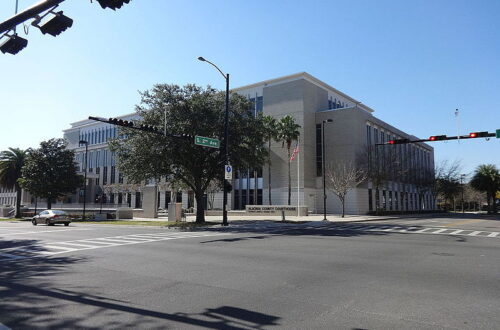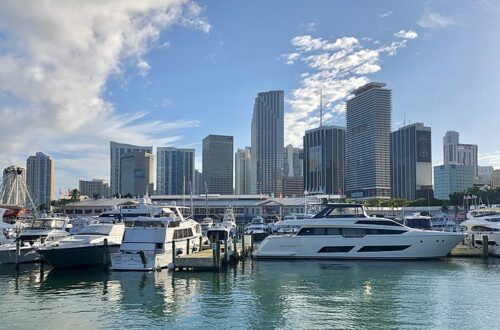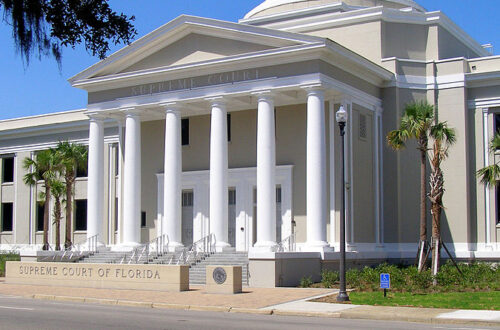Though not a typical election year, the U.S. 2023 off-year elections will feature a number of state and local elections across the nation. Voters will elect new mayors, city councilmen and other positions in their respective municipalities.
One of these constituencies is the city of Jacksonville. It’s the most populated city in Florida and home to the St. Johns River, the longest in Florida.
Featuring seven qualified candidates with one write-in, four of which are female, candidates are running to replace term-limited Republican Mayor Lenny Curry. The race is on Tuesday, March 21, and if no outright majority is achieved, a run-off will take place on May 16 between the top two finishers.
The Florida Political Review spoke with Democratic candidate and former state Sen. Audrey Gibson. Gibson is a veteran of Jacksonville politics, serving as a business community liaison for the Jacksonville Job Corps Center in the 1990s, to being elected as a state representative in 2002, and later as a state senator in 2011 and Florida Senate minority leader. Gibson left Tallahassee after the 2022 elections and has since declared her candidacy for mayor.
If elected, Gibson would be the first-ever female and second Black person to be elected mayor of Jacksonville.
We asked Gibson a series of questions on her background, policy views and priorities. A transcript can be read below.
Q: First, tell us a little bit about yourself and your connections to Jacksonville.
A: Well, thank you so much for the invitation for the interview as I plow forward and create a shift in Jacksonville for the office of the mayor. I was born and raised in Jacksonville and spent some years in Southern California after I graduated from Florida State University with a degree in criminology. I grew up on the north side, and my parents were Ernest and Lois Gibson, two professionals and educators. My mother was the retired dean of health programs from Florida State College at Jacksonville. I just was always engaged in my community, particularly. In between returning from California, I noticed that things were just not changing very much in certain communities, particularly in minority communities. So, I started to raise my voice a little bit and attend community meetings. I said to one of my friends, “Why are you guys not moving forward?”
She said, “Well, they won’t let us.”
I said, “Who’s they?”
I just kept raising a ruckus. My friend said to me, “Well, maybe you should run for office.”
I said, “Well, maybe I should.”
I did just that. When I ran for city council, I lost by about 300 votes. Then a legislative seat came open for the Florida House. I ran for that seat, and I won by over 2,000 votes. So thus began my political career but not my community service career, which I’ve always been a community servant. I see myself as a community servant anyway, even in my role as a former member of the House where I served for eight years. And then there was a special election for the Senate seat in 2011. I only missed one session in 20 years. I won that seat as well, and I just finished my term.
Q: You are one of four females running to be Jacksonville’s next mayor. How does the title Madame Mayor sound to you? How does your historic candidacy make you feel?
A: I feel the same way about all governing rights, regardless of the title. It’s all about the people. It’s great to be among three other women running, and I think that it speaks to the shift I talked about a change in cultural dynamics in Jacksonville and a change in the mindset dynamics. Some of it is forced just because a population shifts, but I believe that we have to look at the office of Mayor differently. It shouldn’t be just a “good old boys position” but all-inclusive.
Q: What are some of your solutions for alleviating the housing and affordability crisis in Jacksonville?
A: I believe that in many cases, the apartment owners can make reasonable adjustments to make up for an increase in property insurance rates. But, I prefer to see what that looks like. What’s the printed percentage increase in the property insurance as compared to the three times increase in the cost of rent? I’m not sure it matches. The Legislature should have included apartment owners in their property insurance in the special session. If they didn’t do that, shame on them. I raised the issue before I left the Senate, doing a rental survey of constituents as well as a mortgage payment survey. We’re looking at up to three times the rent increases in a very timeframe where people can’t catch up.
In Jacksonville, I’ve responded to this question many, many times, and I’ve made many surveys. I believe that infill can help us with affordable housing in some of our neighborhoods continuing not to be what they should be in terms of economic development. In those communities, some of them are older, and you find more abandoned properties and vacant lots. Through infill, you fill in where there are gaps in an existing community. I think the city has to rein in the cost there too because some investors are buying up the property I believe the city should be purchasing. You’ve gotta have some parameters on it.
So, once you build it, there should be an expectation of a specific cost, right? For rent and how often and in what intervals that rent can be increased. We have to protect the people we’re having the folks build affordable housing for. So, I’m exploring all of these ideas because sometimes we don’t think out of the box. The city is buying up some of this land and auctioning off the properties in groups, and maybe there’s two at a time or three at a time. Then, making sure there are parameters with those individuals or companies that buy so people can actually afford to live and state in the housing we’re incentivizing them to build.
Q: Living in Florida, we have heard a lot of the changes being made to education as a public issue. In the candidate forum, you along with others mentioned that although the mayor is not directly involved in school board issues, funding for students should be a priority. Do you have anything else to say on a matter of school choice in Jacksonville or where parental rights should stand in the city?
A: All parents have rights, in statute as in the guidelines in the Department of Education. Parental rights were never an issue. The bill did say it was age appropriate there. All that happened was under the age of or under the grade of nothing below third grade, but it still kept age appropriate.
It was just a mixed bag and totally unnecessary because I believe the whole idea is to attack people in the LGBTQ+ community, to attack African Americans, to implement book banning. It’s all been very negative to divide us because that’s what happens when we have strong feelings about certain things. Parents have always had rights about what happens with their kids in school. In terms of choice, choice exists but turning around and saying we’re just going to do choice and not going to have traditional public schools because when the average daily attendance decreases, then you can’t fund that school.
I believe that when you kill a school, you kill the community. Killing a community is really detrimental to our city, and that’s the way I see it.
Q: What would be your priorities for improving public safety in a big city?
A: I think the issue is about gun violence. When individuals say crime, crime is a big umbrella. Folks are not talking about robberies. We’re not talking about anything right now as it relates to crime, except for gun violence. First, the eradication of gun violence really is a community affair. Obviously, the sheriff is the top law enforcement officer. But, people know things in the community, and I think they’re reluctant to say anything. Part of that is because of retribution, and they don’t feel safe saying something. I learned this from our state attorney. One gun, she said, turns over in the community, multiple times. Sometimes people don’t lock their cars, they leave a gun in the car and the gun gets stolen. That’s a gun on the street in the community that goes from person to person until law enforcement either finds the weapon or finds the perpetrator. So, people need to lock their cars, and I understand nobody should steal. But don’t leave your gun in your car. Even if you lock it. That helps to perpetuate is not your fault, technically. But, it helps to perpetuate the entree of guns into the community when you do that. To parents who sometimes live in fear in their home too, though, that’s another thing. We have to figure out how we can encourage them to come forward and make it safe to do so. Look in the closets. Look under the bed. Look in the backpacks. Most people know there’s a gun in that house, right? It’s a community affair, to be able to deal with gun violence.
Now we have permitless carry, “Oh we’re still going to do the background check.”
But still, it’s almost a ding-in trying to check that maybe a gun that was stolen because some people don’t even report the gun stolen. So that’s another issue. The solution or part of the solution is within every household. Even if you don’t think there may be a gun, your child’s friend may have a gun. You have to talk to the parents, and we have to talk to each other. We used to say it’s 11 o’clock, do you know where your children are?
I believe something like that is a very simple thing. Something like that to give more awareness to the community is how we’re going to get through this.
Also, it’s our young people too. Jacksonville’s average population is 37, which is pretty young. I believe that the brashness occurred because of the age. We serve a younger cycle to go through. Now, the mentality is just go grab a gun or ask your friend for a gun. That’s where we are right now. We need prevention. We’re going to have to do intervention and come together as a community to keep our community safe.
Q: What makes you the best candidate? What distinguishes you from the other candidates?
A: It’s all about turnout. I have the budget experience, years and years of it. I’ve been on all the budget committees there are, including transportation, economic development, appropriations, Development is the meat of what we’re trying to do in Jacksonville. We are trying to build a bill of economic development, to be inclusive and create unity, sort our infrastructure, straighten our sidewalks and close ditches. Especially doing those things in our marginalized communities.
My plan is to bring more small, locally owned businesses into those communities, which then keeps the money circulating in that community and then increases the economic development there. Talk is talk, but walking is walking. I’ve walked the walk for years. Not just in my sole district, which my Senate district was just about half of Jacksonville, but I love anybody anywhere. I don’t care where they live. So, I can speak out for or against as mayor, for or against policy the city council decides to do, which we haven’t had much speed out of the mayor’s administration over the years.
As mayor I want to make sure I’m opening the doors that will be accessible. Many of the city meetings are held at times when people work, so I want to make sure that I’m setting times when I can meet with community stakeholders and not the usual ones who always get to come but the general public, those who feel left out and not so powerful. Those are the folks I want to talk to. I believe my campaign is on track. I have been elected before and have actually the longest and most experience of any candidate in this race.
Q: What is your message to Florida students?
A: My message to Florida students is we need to plan in this community as though the next generation will be taking over. Not planned for just today but for the future. We’re all already older. If we only plan for today, then what? What does the future generation have? What do they inherit? There should be a basis for that generation to continue to move forward, not to have to go back and try to make neighborhoods better. That should have happened already. They should be able to add more economic development and more planning and more resiliency to that community as opposed to trying to start from scratch. They shouldn’t have to think, “Wow, we need infill, because we don’t have enough housing for people.” We’re fighting against rent, gouging.
All of those, I believe that we should leave the city in a way that the next generation can pick up and continue. The future is what it’s all about. Education is very, very important. For Jacksonville, the change in demographics is very important for the young generation who lives in the city to keep that in mind for inclusiveness and unity. Jacksonville can’t be a major modern city when people are at each other’s throats when people are left behind. When there’s no thought process of planning and moving the city forward, particularly in tourism, I believe we need to increase our tourism in Jacksonville. So, when folks are going to a NASCAR race or going to Disney, we want to make sure they have one stop here in Jacksonville for those who are traveling this way to spend some time and money.
End Q&A
Jacksonville’s consolidated government uses a unitary election system outside the national and statewide election cycle. While candidates are partisan and campaign with their political party, every candidate runs together in the same primary election taking place on Tuesday. Any candidate who reaches majority support will win the mayorship outright. Otherwise, the top two candidates move on to a general run-off election May 16, 2023.
Check out other recent articles from the Florida Political Review here.
Featured image: Florida Political Review candidate Q&A graphic depicting Audrey Gibson. Image by Maria Varas.





